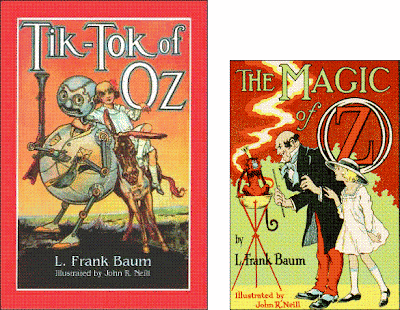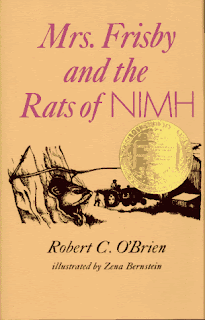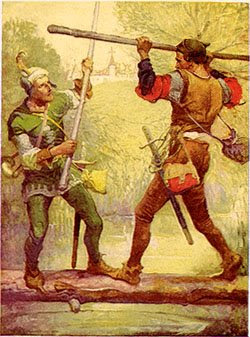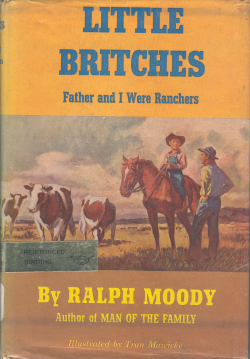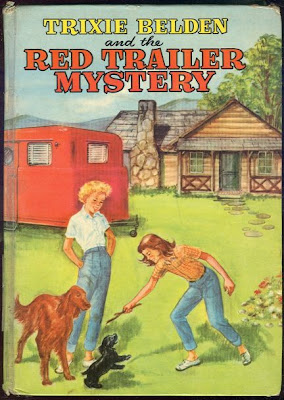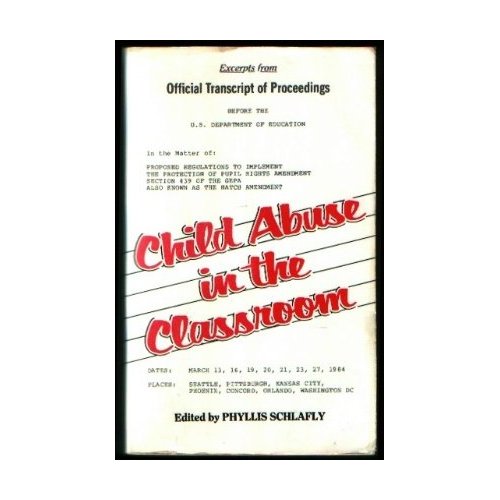
Delightful Discipline, Goodgame's reminisces of growing up in a Polish-American family, was so funny I read the book aloud to my family even in restaurants.
Here's an excerpt and some of my thoughts after ...
At the age of four, I experienced another example of mother's discipline which left her mark on me.
For being a good boy, mother rewarded me with a trip to the local Woolworth store and the privilege of selecting one ten cent toy. I am of the opinion that more parental authority has been lost in Woolworth dime stores than probably any other public structure. (Not that Woolworth is the chief offender; any modern shopping center will provide equal opportunity for rebellion.)
Mother deposited me at the toy counter under strict orders to remain there awaiting her return. Actually, wild hippos couldn't have enticed me from those treasures. My serious meditations were abruptly violated by a small boy and his mother. This mannerless male shoved me rudely aside and began grabbing toys wholesale. His mother pleaded for moderation, but to no avail. I was shocked by his behavior, yet fascinated by the amount of plunder it produced.
"Rupert," the mother sniffed, "don't you think you've quite enough toys?"
He never gave her the courtesy of a reply as he continued to rip toys off the counter and fling them into her out-stretched shopping bag.
"Rupert, dearest," she pleaded, "unless you come with me this very instant, I shall be forced to speak to your father." Rupert merely glared and kept on grabbing. "Now, Rupert," she cautioned, "perhaps father shall be so upset with your conduct that he might even be forced to spank-"
She never finished. At the very mention of the word "spank," Rupert went into instant insanity. With a screech he hurled himself head-long to the floor, kicking and thrashing like a snake in a lawn mower. He was magnificent!
Rupert's mother immediately dropped to his stricken side, sobbing apologies for having hurt his finer sensibilities. All sorts of desserts and bribes were promised if he'd only stop screaming and be a good boy. Rupert's recovery was as remarkable as his affliction. He hopped to his feet and filled the shopping bag, then dragged mother to the candy counter. At the time, I thought their togetherness, each attached to the shopping bag between them, was pure tenderness.
Rupert's theatrics were not wasted, as I was inspired to use the same act on my mother. It seemed most logical that she would be too embarrassed to punish me in public, especially in the presence of strangers. The walk home would also work to my advantage, allowing time to cool her ardor. Besides, unlike Rupert, I would only request one additional toy. I was positive that mother would reward such unselfishness.
I went into action. From the vast array of toys I selected two, a blue Model A car and a red World War I German Fokker airplane. My expectations were so great that I forgot mother's command to stay at the toy counter and I sought her out in the "no man's land" of women's wear. "Mommie," I gushed, "these are the toys I want."
"Junior," she reminded, "why didn't you wait for me at the toy counter?"
"I'm sorry," I explained, "but I just wanted these toys."
"Well, all right," mother replied, "give me the one you want and take the other back and wait for me there like I told you."
I was apprehensive at mother's blindnesss to my needs, but with the success of Rupert still music in my ears I pressed on. "But, Mommie," I begged, "I've been such a good boy, can't I have two toys?"
"Do what I told you," she said firmly.
A small group of spectators began to collect and I gathered courage from their presence. The moment of truth had come, I stood my ground.
"If words fail to move you," mother warned, "I might have to spank ..."
Spank! The magic word, and like Rupert I responded on cue. With a shriek I dropped to the floor, noting with satisfaction the startled expression on mother's face. I had just begun to thrash when I felt her tender hands lifting me to my feet. "It worked!" I thought, as I helpfully turned toward the direction of the cash register. Then, all came crashing down as mother re-wrote the ending. Her actions were shockingly swift and professionally pure as she stripped my short pants to my ankles and upended me over her knee. In this woefully exposed position, I received personal tutoring.
"Lesson one," she spoke as her hand descended, "if words won't move you, something else will."
I immediately took this lesson to heart and elsewhere.
"Lesson two," she continued, "whenever you cry for something, you won't get it."
Both of us were now warming up to the subject at hand.
"Lesson three," she concluded, "toys are not worth crying over, so I shall provide you with something worthy of your tears."
I cried, honestly and unashamedly, with mother's full approval. Lessons reinforced, she set me upright, restoring my pants to their former honor, which now barely covered my embarrassments. I looked to the crowd for some shred of sympathy, but I stood alone. Even Rupert would have disowned me for the way I had botched the job.
"Take one toy back," mother gently reminded me.
I recognized this as a command, not a request, but rebellion dies hard, even in a four-year-old. I gave it one final shot. "Mommie, I pleaded, "can't I have both toys since you've already spanked me for them?"
A ripple of admiration came from the crowd, but my mother was not to be intimidated. "Junior," she explained, "one toy is yours for being good, you earned that toy. But for the other toy you were naughty, and I'm not going to give you a toy for being bad."
A wave of praise burst forth from the multitude. Even Solomon would have been impressed at mother's wisdom. "Now be a good boy and take one toy back," mother urged.
In full view of the admiring throng, I obeyed. We left Woolworth's together. With one hand I held my toy, the other clutched my mother. Somehow I knew as never before how much she loved me.
Even today, when I enter a dime store, memories of my mother's firmness tickle my heart, especially if the Ruperts are still practicing their profession. For who else but a real mother could have taught her son a million-dollar lesson in a dime store?
from Chapter Three: Woolworth Wail-out
Sapphireslinger again:
This is why, Lord willing, I will never send my children to daycare. Sending them to pick up every other kid's bad habits at an age when they have little objective judgment, and to be haphazardly disciplined by people to whom daycare is a job and not a family?!
I hope my children will eventually go into the world as lights, but can't they have a childhood immersed in good stuff first?
The way you're trained to find counterfeit money is by learning the good money by heart so that when anything is the least bit off, it stands out from a mile away.
I have heard all sorts of nonsense excuses for sending children to public school, including that they'd be a "light in the darkness" for the other, less spiritual children. That's a heavy expectation indeed, for someone who probably can't even tie thier own shoes.
The sad fact is that most parents spend less than 1 hour a day of quality time with their school-aged children. We expect them to learn OUR values in 1 hour a day, and hold them responsible if they don't. Yet at the same time, we expect them to be exposed to the attitudes, philosophies, curriculums and beliefs of people who may think the exact opposite from us for 6 or more hours per day - and not absorb any of it!
Read the rest of "Be Still My Soul"'s article here.
There is a time to shelter and a time to transition, but I don't think preschool is the time to send them out as little lights into the world. Don't you remember being little and not able to step back objectively until you reached a certain age?
From the time they begin walking I will teach them to be as independent as possible in everything except dealing with peer pressure and a deluge of bad attitudes before their judgment has firmed up into the more abstract logic stage.
From the time they can speak I will be asking them, "Now, how would you answer this and this?" and showing them how to put their answers into words on paper, and in speeches, and on websites.
But to make it mandatory that they spend eight hours a day in a public school immersed in peer pressure with no time for their own dreams or learning to take charge of their own education?? They'll get enough feedback from their neighbors, friends, relatives, and the comments people leave on their websites. But it will be meaningful feedback, peer pressure with breathing space; not the visceral response of the pack in the classroom and on the track, where logic means nothing but being trapped in a mind that either fears or bows to the latest popularity.
If it's social interaction you want, I'd rather take them for six months to horseback across Mongolia letting them bounce their ideas off people they meet along the way.
Imagine a girl going through a rough time in public school, thinking the world begins and ends with her classmates. I can't think of a better way to extricate her from such an artificial hell than to send her, say, horseback riding across Mongolia for half a year. Now imagine her coming back to the same school and peers. Now, how much is she going to take seriously what they say? How much distance, aka perspective, will she have acquired that she can now hold their influence at arms' length and have a firm self at her center.
(But how could you send her to Mongolia if she is locked into the inflexible school year schedule and the rat race of test scores?)
Remember the movie Castaway, how Tom Hanks was so much more aware and in control of himself after having been temporarily blasted out of the rat race?
That is what I want to give my children with homeschooling: Distance, and the ability to recognize the off-kilter without my saying a word, because they were immersed in a world of good and love and respect and sharpened minds... during their early formative years, when they need to first know love, before they know what love is
not.
So yes, I want to give my children both more shelter and yet more freedom and responsibility than the average public school. I want to give them both a happier childhood and a wiser maturity. I do not want the wasted life of
Ferris Bueller-come-Clinton for my children.
All of the following famous people were educated at home, and it didn't seem to hurt their world-changing abilities any:
Generals 上將
Stonewall Jackson 托馬斯*傑克遜
Robert E. Lee 羅伯特·李
Douglas MacArthur 道格拉斯·麥克阿瑟
George Patten
Inventors 發明家
Alexander Graham Bell 亞歷山大· 格拉漢姆 · 貝爾
Thomas Edison 托馬斯·愛迪生
Orville and Wilbur Wright 萊特兄弟
Painters 畫家
Claude Monet 克勞德·莫奈
Andrew Wyeth 安德魯·魏斯
Preachers 傳道者
John Wesley 約翰·衛斯理
Scientists 科學家
George Washington Carver 喬治·華盛頓·卡佛
Pierre Curie 皮埃尔·居里
Albert Einstein 愛因斯坦
U.S. Presidents USA 總統
George Washington 喬治·華盛頓
John Quincy Adams 約翰·昆西·亞當斯
William Henry Harrison 威廉·亨利·哈里森
Abraham Lincoln 亞伯拉罕·林肯
James Madison 詹姆斯·麥迪遜
Franklin Delano Roosevelt 富蘭克林·德拉諾·羅斯福
Woodrow Wilson 伍德羅·威爾遜
World Statesmen 政治家
Winston Churchill 溫斯頓·丘吉爾
Benjamin Franklin 本傑明·富蘭克林
Patrick Henry 帕特里克·亨利
William Penn
Writers 作者
Hans Christian Anderson
Pearl Buck 賽珍珠
Agatha Christie 阿加莎·克里斯蒂
Charles Dickens 查爾斯·狄更斯
C. S. Lewis C·S·路易斯
George Bernard Shaw 蕭伯納
Others 其他
Charlie Chaplin, actor 查理·卓别林
George Rogers Clark, explorer 喬治·羅傑茲·克拉克
Andrew Carnagie, industrialist
-- a partial list from Home-Style Teaching by Raymond and Dorothy Moore
Related Posts:
Homeschooling, A Free Luxury Education













 Another set of covers (these I used to own):
Another set of covers (these I used to own):

















